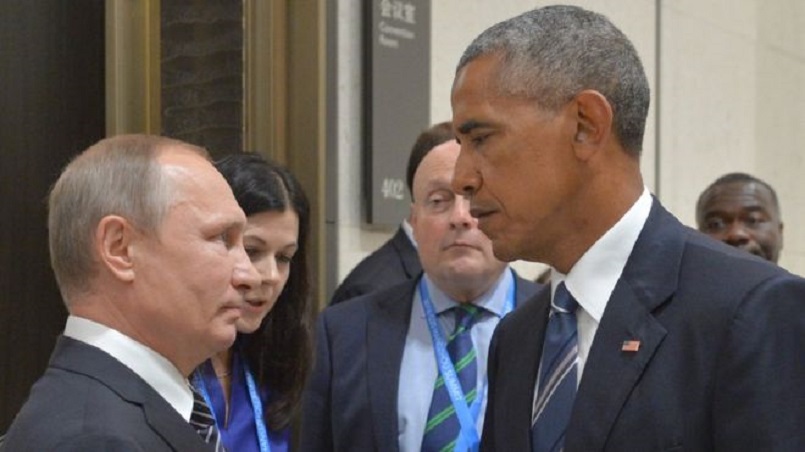
US claims that Russia hacked official emails, without evidence, are "indecent", the Kremlin has said.
"They need to either stop talking about this or finally present some sort of proof," Russian President Vladimir Putin's spokesman said.
On Friday, Hillary Clinton said Mr Putin ordered the hack because he had a "personal beef" against her.
President Barack Obama has vowed to take action against Russia for its alleged interference.
"We need to take action and we will," he told US public radio network NPR.
Russia stands accused by the US of hacking the emails of the Democratic Party and a key Hillary Clinton aide, which the Kremlin strongly denies.
Republican President-elect Donald Trump has also dismissed the claim as "ridiculous" and politically motivated.
The intelligence agencies say they have overwhelming evidence that Russian hackers linked to the Kremlin were behind the hacks.
On Thursday, a White House spokesman said President Vladimir Putin was involved in the cyber-attacks.
Hours later, Mr Obama said: "I think there's no doubt that when any foreign government tries to impact on the integrity of our elections, that we need to take action and we will, at a time and a place of our own choosing.
"Some of it may be explicit and publicised. Some of it may not be.
"Mr Putin is well aware of my feelings about this, because I spoke to him directly about it."
It is not clear what action the US intends to take, with Mr Obama leaving office on 20 January.
The disclosure of emails was embarrassing to the Democratic Party at a crucial point in the election campaign.
What was in the hacked emails?
- More than 19,000 internal Democratic National Committee emails, published by WikiLeaks on 22 July, appeared to show party officials tried to thwart the campaign of Mrs Clinton's rival, Bernie Sanders.
- WikiLeaks published swathes of emails in October and November from the account of Mrs Clinton's campaign boss, John Podesta
- Among the most damaging revelations were suggestions that donors to the Clinton Foundation gained special access to former President Bill Clinton, and that Mrs Clinton had maintained a closer relationship with Wall Street bankers that she admitted on the campaign trail
In early December, the hacker tried to sell more than 100 login credentials from the US Election Assistance Commission, the firm Recorded Future said.
The company said its researchers discovered the breach when monitoring underground electronic markets, and posed as a potential buyer to engage the hacker in conversation, before alerting law enforcement agencies.
Mr Trump has accused the Democrats of fabricating Russian involvement to hide their embarrassment at the election defeat.
He has also long expressed admiration for Mr Putin, and his pick for secretary of state - oil tycoon Rex Tillerson, who has worked closely with the Russian leader - has raised concerns.
The president-elect has been assembling his new administration and on Thursday he said he would pick lawyer David Friedman to be his ambassador to Israel.
